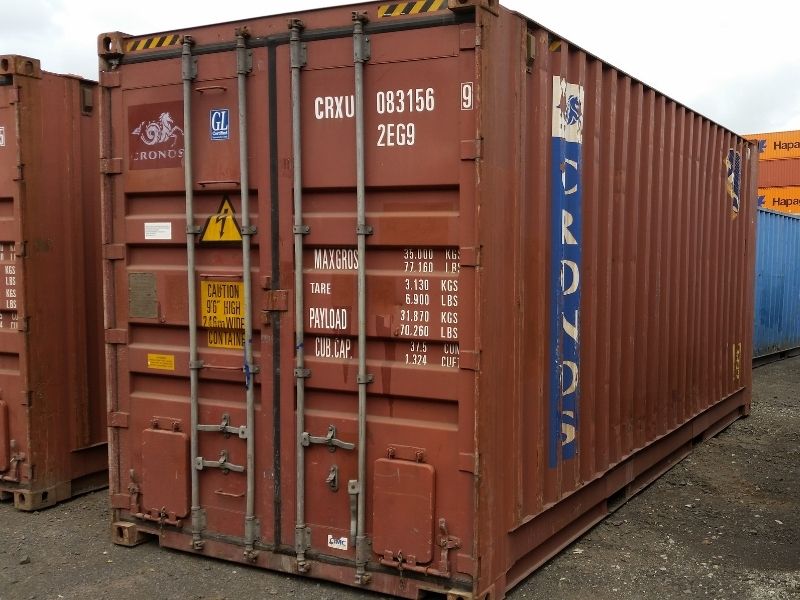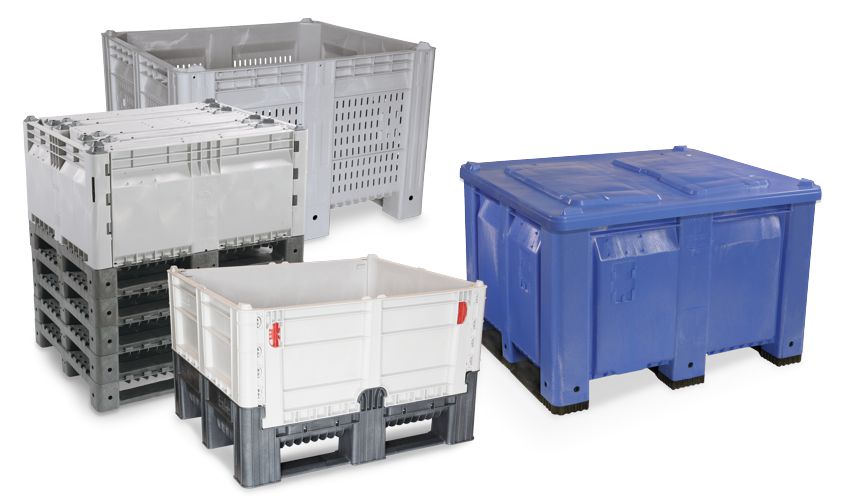Why Bulk Containers Are Necessary for Affordable and sustainable Transportation
Bulk containers play a vital role in contemporary logistics. They assist in the efficient movement of huge quantities of items, thereby enhancing transport procedures. This technique not just reduces prices however additionally lessens ecological influence with lower discharges and waste generation. As markets seek more sustainable methods, the fostering of bulk containers is ending up being progressively considerable. What ramifications does this shift hold for future logistics and supply chain monitoring?

The Benefits of Making Use Of Mass Containers in Logistics
Bulk containers reinvent logistics by enhancing efficiency and sustainability. These containers enable the transportation of big quantities of items in a solitary trip, considerably decreasing the variety of journeys called for. This not only improves operations however likewise reduces labor prices associated with handling, loading, and dumping. Furthermore, bulk containers are designed to optimize space utilization within transportation automobiles, making certain that more items can be delivered all at once.
The standardization of mass containers additionally simplifies the logistics procedure. With consistent measurements, they can be conveniently piled and kept, bring about improved storehouse management. Bulk containers usually include durable materials that protect components from damages during transportation, therefore reducing product loss and enhancing total dependability. Consequently, services can experience improved supply chain efficiency, eventually leading to enhanced profitability and consumer contentment. This combination of factors makes mass containers an essential property in modern-day logistics.
Environmental Effect: Minimizing Waste and Carbon Impact
As sectors increasingly focus on sustainability, the adoption of mass containers has actually become a vital approach for lowering waste and reducing carbon impacts. These containers reduce making use of packaging products, such as boxes and plastic, consequently especially lowering overall waste generation. By consolidating shipments, bulk containers enhance transportation effectiveness, enabling more items to be carried per journey. This reduction in journeys straight correlates with reduced greenhouse gas exhausts, adding to a smaller sized carbon impact.
Additionally, mass containers can typically be reused or recycled, better alleviating ecological influence. The toughness of these containers guarantees they can withstand numerous transport cycles, lowering the demand for single-use alternatives. used plastic containers. By improving logistics and advertising efficient source usage, bulk containers not just sustain lasting practices however also motivate sectors to align with international ecological goals. Eventually, their application shows a commitment to environmental stewardship and liable source management
Expense Financial Savings: How Bulk Containers Lower Transportation Expenditures
While several business seek means to boost their profits, using bulk containers offers a considerable chance for decreasing transportation expenditures. Mass containers optimize the quantity of products moved, permitting services to deliver larger quantities simultaneously. This performance lowers the number of journeys needed, directly reducing gas costs and minimizing labor expenses related to loading and unloading.
Additionally, bulk containers often include structured layouts that maximize room utilization within transportation lorries. This suggests fewer empty areas, bring about extra reliable use available ability. Furthermore, the longevity of bulk containers can lower the danger of item damages during transit, lowering losses and making certain that even more products show up undamaged.
Enhancing Supply Chain Performance With Mass Storage Space Solutions
Mass storage options play an essential duty in enhancing supply chain efficiency by optimizing inventory administration. By consolidating items right into less, bigger containers, organizations can considerably decrease taking care of prices connected with regular transfers and handling. This streamlined technique enables much better tracking and monitoring of inventory, ultimately bring about boosted functional efficiency.
Structured Stock Administration
Effective inventory management is essential for maximizing supply chain operations, specifically when organizations adopt bulk storage space remedies. These services allow businesses to keep greater stock degrees while decreasing the frequency of replenishment. By combining materials right into bulk containers, business can simplify their supply procedures, decreasing the intricacy related to tracking multiple smaller plans. This technique facilitates accurate supply matters and improves forecasting precision, permitting more informed decision-making. In enhancement, mass storage remedies streamline storehouse organization, making it less complicated to situate and gain access to items when required. As a result, organizations can accomplish a more reliable stock turn over price, inevitably enhancing overall supply chain efficiency and lowering the likelihood of stockouts or overstock situations.

Decreased Handling Expenses
The application of mass storage remedies not just enhances supply management however also considerably lowers handling expenses across the supply chain. By settling products into bulk containers, companies reduce the demand for constant handling and transfer between different storage space and transportation systems. This method reduces labor prices connected with loading, dumping, and relocating smaller packages. Additionally, mass storage decreases the frequency of deliveries, bring about reduced transport costs and lowered gas intake. As an outcome, organizations can maximize their logistics operations, enabling an extra efficient appropriation of resources. Eventually, lowered managing prices add to enhanced general supply chain effectiveness, cultivating an atmosphere that sustains both sustainability and economic stability.

Adaptability of Bulk Containers Throughout Numerous Industries
Lots of sectors have distinct demands for transport and storage, mass containers have actually emerged as a flexible service that meets a wide array of needs. These containers, ranging from large bins to specialized containers, can try here accommodate varied materials, including powders, granules, and fluids. In the agricultural field, mass containers assist in the transport of plant foods and grains, while the food and beverage industry utilizes them for active ingredients and finished products. The chemical sector relies upon bulk containers for safely delivering dangerous materials, guaranteeing compliance with safety policies. Additionally, building firms take advantage of bulk containers for transferring aggregates and various other products. Their adaptability encompasses different settings of transportation, consisting of ships, trains, and vehicles, enhancing logistical performance. This flexibility not only improves operations across various markets however likewise advertises sustainability by minimizing packaging waste and optimizing room in transit. Therefore, mass containers play a crucial role in modern supply chain management.
Future Fads in Bulk Container Usage and Sustainability
The future of mass container usage is progressively formed by cutting-edge products growth that improves sustainability. In addition, automation in logistics assures to simplify procedures, reducing waste and improving performance. Embracing round economic climate practices will certainly better transform exactly how bulk containers are designed, utilized, and reused, fostering a much more lasting transport landscape.
Ingenious Products Growth
As industries increasingly prioritize sustainability, cutting-edge materials development in mass containers becomes a substantial element in improving green transportation options. Researchers and suppliers are checking out biodegradable plastics, recycled compounds, and lightweight metals to minimize ecological impact. These products not just reduce waste however additionally enhance gas efficiency by decreasing the overall weight of containers. Furthermore, improvements in wise products, which can adjust to varying problems, improve the sturdiness and capability of bulk containers. The integration of these ingenious materials lines up with round economic climate principles, advertising reuse and recycling. As the demand for sustainable practices grows, the growth of such materials will play an essential role in shaping the future of mass container use in logistics and transportation.
Automation in Logistics
Significant improvements in automation are poised to change logistics and the application of mass containers, boosting sustainability in transport. Automated systems, including drones and self-governing vehicles, are streamlining the motion of bulk containers, minimizing the reliance on standard fuel-powered transportation. These modern technologies maximize directing and packing procedures, decreasing empty miles and improving fuel efficiency. In addition, automated supply administration systems boost monitoring and tracking of bulk containers, making certain better resource allocation and minimized waste. The assimilation of the Web of Things (IoT) allows real-time data analysis, making it possible for proactive decision-making that straightens with sustainability objectives. As automation remains to progress, it is anticipated to drive even more developments wholesale container use, ultimately sustaining even more sustainable logistics techniques and lowering the ecological influence of transportation.
Round Economic Situation Practices
Improvements in automation are setting the stage for a much more integrated strategy to round economic climate practices in the domain of bulk container use. As industries increasingly go to my blog welcome sustainability, bulk containers are being designed for site here durability and reusability. This change not only lessens waste yet also enhances source efficiency. Business are adopting approaches such as closed-loop systems, where utilized containers are accumulated, reconditioned, and reestablished right into the supply chain. Furthermore, smart innovations track container life process, facilitating much better management and reducing ecological effect. The cooperation in between makers, logistics providers, and end-users is vital in establishing standards for sustainable container use. used collapsible bulk containers. Future trends indicate a growing focus on materials that are recyclable and naturally degradable, more enhancing the circular economy's principles in bulk transportation

Often Asked Questions
What Products Are Bulk Containers Commonly Made From?
Mass containers are typically created from sturdy products such as high-density polyethylene, steel, light weight aluminum, and cardboard. These materials supply defense, strength, and convenience, making them appropriate for moving different goods in various markets efficiently.
Exactly how Do I Pick the Right Size Mass Container?
Choosing the best size bulk container involves evaluating the quantity of products to be transferred, thinking about handling devices compatibility, and evaluating storage room needs. Proper size assurances efficiency in transport and minimizes waste during shipment.
Are Bulk Containers Reusable or Recyclable?
Mass containers are usually multiple-use, designed for numerous journeys, improving sustainability. Many can likewise be recycled, depending on the products made use of. Picking recyclable alternatives even more sustains environmental objectives and decreases waste in transport techniques.
What Security Regulations Apply to Bulk Container Transportation?
Security laws for mass container transport consist of compliance with the Division of Transportation standards, proper labeling of unsafe products, structural integrity analyses, and adherence to weight limitations to assure risk-free handling and prevent accidents during transportation.
Just How Can Organizations Transition to Using Bulk Containers Properly?
Companies can change to bulk containers by assessing present logistics, educating personnel on handling, buying ideal tools, optimizing inventory administration, and working together with suppliers to assure compatibility and efficiency throughout the supply chain.
As markets progressively prioritize sustainability, the adoption of mass containers has emerged as an essential method for lowering waste and decreasing carbon impacts. By settling materials into bulk containers, firms can simplify their inventory procedures, minimizing the intricacy associated with tracking several smaller packages. As markets significantly prioritize sustainability, innovative materials growth in bulk containers arises as a substantial factor in boosting green transport solutions. Automated systems, including drones and autonomous cars, are enhancing the activity of mass containers, minimizing the dependence on standard fuel-powered transport. Furthermore, automated inventory administration systems improve monitoring and monitoring of bulk containers, ensuring better source appropriation and minimized waste.